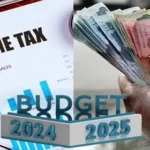Pakistan’s Federal Budget 2024–25, which was swiftly approved with modifications pushed by the IMF, has drawn criticism for having a high tax load and few benefits. The budget has increased the cost of travel by a considerable amount, doubled the tax rate on the salaried class, and increased the price of gasoline and diesel. High salaries have now been subject to a punitive 10 per cent levy. The new levies also apply to transactions involving real estate, cell phones, and even necessities like milk.
The budget’s focus on increasing taxes rather than widening the tax net is reminiscent of previous, ineffective fiscal policies. Instead of equitable taxation, it has targeted the already overburdened salaried class, whose purchasing power has significantly diminished over the past five years. Conversely, banks, which have enjoyed record profits, have seen tax reductions, highlighting the government’s reliance on borrowing from financial institutions to bridge fiscal deficits.
Despite these measures, the budget offers no meaningful solutions for the country’s overwhelming debt burden. Pakistan’s debt servicing obligations are among the highest in the world, consuming a vast portion of government revenue and leaving little room for essential social spending. This trend is likely to continue, perpetuating a cycle of high taxes and low public investment, which hinders long-term economic growth and development.
Moreover, the budget’s inflation outlook raises concerns. With an ambitious tax collection target and a key portion allocated to debt servicing, managing inflation appears challenging. The IMF’s higher inflation predictions exacerbate these concerns, casting doubt on the government’s ability to maintain economic stability.
Essentially, the budget ignores the fundamental problems of debt and spending while punishing current taxpayers. The budget runs the risk of escalating economic instability and social unrest by placing an additional weight of taxes on the already stretched salaried class while neglecting to expand the tax base. An inclusive and more balanced fiscal strategy that equally divides the tax burden and encourages investment is required if Pakistan is to see sustainable growth.
Faisal Waqas is a passionate journalist who has over 10 years of diversified experience in print, electronic and digital media. He has previously worked with other renowned private TV channels as well as English Newspaper and now associated with Daily Point as Web Editor. Faisal has graduated from the University of Punjab and earned his M.Phil degree in Mass Communication from Superior University of Lahore.































